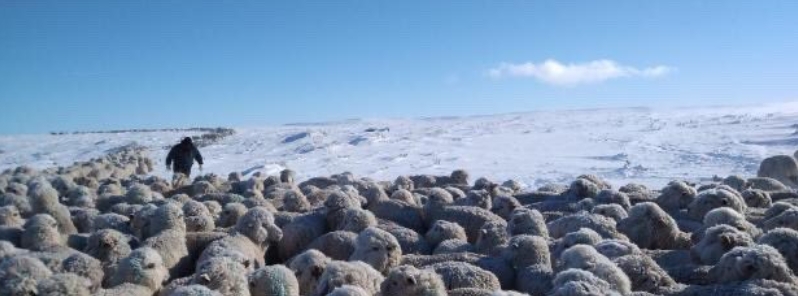Patagonia reels from one of its worst winters in 20 years, agricultural emergency declared

Residents in South America's Patagonia region are experiencing one of the area's harshest winters in the last 20 years. Intense rains, heavy snowfall, and below-freezing temperatures also affected the agricultural sector, prompting authorities to declare an emergency.
The National Meteorological Service issued an alert for persistent snowfall for the mountainous areas of southern and central Mendoza, central and western areas of Neuquen, and central Rio Negro.
Last week, more than 1 m (3 feet) of snow prompted road closures as temperatures also pummeled to -23 °C (-9 °F), mainly in Rio Negro.
According to media, this has been one of the worst winters in the last 20 years, particularly in the aforementioned provinces and Chubut.
In Neuquen, heavy rain and snowfall caused flooding as the drainage system burst due to the increase of Limay River's water level.
The road ministry reported that a storm left 100 trucks stranded between Collon Cura and Piedra del Aguila. Power outages occurred in various areas in Zapala and El Cholar.
Windstorms and heavy snowfall created difficult conditions as roads have been cut and waterlogging problems have risen. Among the blocked roads is the Pino Hachado international crossing due to the accumulation of snow and ice on road. Strong winds prevented road crews from working on the site.
.
Más de 1 Metro de nieve y las pérdidas aún no se pueden cuantificar.
Hay que salvar a toda las majadas y hacienda posible. El trabajo de años de los productores del sur.
Los acompañamos y estamos a disposición. #SomosCRA
— CRA (@CRAprensa) July 28, 2020
El temporal de frío, viento y nieve en la Patagonia hace más dificultoso el trabajo, pero el esfuerzo y pasión de cada uno de los trabajadores de la compañía @YPFoficial permite que el suministro de energía siga llegando al país. #EnergíaQueNoSeDetiene pic.twitter.com/Ejfr9bNRMA
— EconoJournal (@econojournal) July 30, 2020
Temporal de Nieve en Chubut. situación en Cushamen. Saturnino Antinao en diálogo con Radio Patagonia! pic.twitter.com/SVg6I7vtlA
— Huentelaf Gustavo (@huentenegro) July 28, 2020
This week, the Ministry of Agriculture, Livestock, and Fisheries of the Nation called a meeting of the Federal Agricultural Council to discuss how to deal with the heavy damage, such as severe frosts in the same areas, as well as in Santa Cruz and Tierra del Fuego.
"We recognize that there is a complex situation in the Patagonian region and it is essential that the State is present," said minister Luis Basterra.
The officials decided to make all tools and emergency programs available so the affected provinces can immediately cope.
Desde SRA ponemos a disposición de productores y autoridades locales nuestra extensa red de directores y delegados zonales ante la compleja situación climática que atraviesan miles de ganaderos ovinos y otras producciones de la Patagonia y el sur de nuestro país. pic.twitter.com/UXKyZuLVtq
— Sociedad Rural (@SociedadRural) July 25, 2020
Declaran #Emergencia agropecuaria y comienza la asistencia financiera y técnica a las zonas afectadas por las fuertes nevadas https://t.co/5JZO7g12x4 #Agro #Nieve #Patagonia #Temporal pic.twitter.com/NnwwYh1d5z
— Daniel Aprile (@apriledaniel) July 30, 2020
An agricultural disaster emergency has been declared for the affected territories. Among the worst hit was the sheep sector, which was already suffering due to the coronavirus pandemic.
"It is required, immediately, to assist and rescue isolated producers, recover the animals trapped in the snow and generate with a solidarity network to provide the necessary food for the affected animals," said an official.
#Alarma en el sur del país por impresionante #Temporal de #Nieve que afecta a toda la #Patagonia #QuedateEnCasa, quedate con @CharlyAlvarezok y @valentinacaff en #PrimeraEdición
Seguinos #EnVivo
https://t.co/6ZOrri2llJ
#YouTube → https://t.co/2XGO5VfDcm pic.twitter.com/AtWqRTY6zh— cronica (@CronicaTV) July 28, 2020
Featured image credit: CRA

When the magnetic north pole crosses the LOMONOSOV ridge. . . . . and the magnetic excursion continues to times unknown to us. . . . . . . we must adapt to the ongoing climatic changes that result from it, including the weakening of the magnetic field that protects us from harmful radiation
i’m concerned about geomagnetic storms. we can adapt to climate stuff.